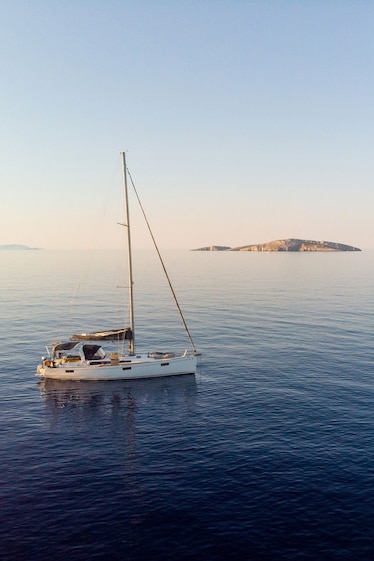When planning a 2020 sailing trip in Greece, Bettina Trittmann knew she wanted a cruise that offered less of a carbon footprint than other cruise ships did.
The 57-year-old German mediator booked a week-long unconventional sailing tour around a few of Greece’s islands with Aegean Cargo Sailing, a social cooperative that blends sustainable cargo shipping with cultural tourism.
During summer, travelers can join Loucas Gourtsoyannis, the 77-year-old captain, on his deliveries around the Greek archipelago to meet producers and sample their wares: rare goat cheese, aromatic island honey, or freshly picked herbs. In between errands, guests visit museums, trek ancient walking trails, and enjoy dips in emerald waters.
“I found the trip to be a very personal experience in every regard,” Trittmann says. She joined again the following year.
Aegean Cargo Sailing is part of a growing, zero-emission cargo sailing movement that includes projects such as Blue Schooner, Tres Hombres, and Avontuur. Using both traditional sailing methods (wind, tides) and modern ones (electric or solar powered motors), these crafts provide an alternative to industrial, fossil fuel-powered shipping. Cargo ships move around 90 percent of the world’s trade, contributing to three percent of all greenhouse gas emissions.
Gourtsoyannis says preserving the work of small-scale farmers helps to safeguard Greek biodiversity and culture. “By supporting them, we improve their quality of life and encourage [farmers and visitors] to return to these lands,” he says. “They will be better, and society will be better.”
Here’s how travelers can experience this newer way to explore Greece’s agricultural and gastronomical revival.
A return to agriculture
On Kea, a small Cycladic island just an hour by ferry from Athens, 27 cows graze the pastures owned by John and Alexandro Mikoniatis. After spending a decade on mainland Greece, the two brothers returned to Kea in 2018 to work and expand their parents’ farm.
The siblings transform milk from their free-range cows, sheep, and goats into rich regional cheeses. They include malako, a soft sheep cheese, and kopanisti, a spicy Protected Designation of Origin cheese for the Cycladic Islands.
“With such raw material, it’s impossible not to make a good final product,” says 32-year-old John.
Due to several decades of economic woes and a decline in traditional agriculture, rural Greek islands emptied as young people left for better opportunities. For example, Santorini was once a vital tomato production center—today, only a museum and a few farmers are left.
(Explore 3,000-year-old hiking trails on this remarkable Greek island.)
As faster passenger ferries took to the Aegean Sea, direct routes to lesser known islands were severed, making trade and travel more difficult. To get an order to a neighboring island, farmers had to send it to Athens first and then have it shipped back into the Aegean.
But now, the younger generations, like the Mikoniatises, are slowly trickling back to these nearly forgotten isles to preserve and share the region’s culinary and cultural gems. With the support of companies such as Aegean Cargo Sailing, small-scale farmers are able to share their products with restaurants and suppliers across 22 Greek islands—and tourists are invited to join the experience.
The best way to explore the Greek archipelago
Dimitra Pappa, Aegean Cargo Sailing’s coordinator, says that when somebody joins Gourtsoyannis’ 15-foot-long schooner, they essentially become crew members, assisting with anything from pulling rope to dropping the anchor.
“You have to be a bit crazy to do this,” says Antonis Psaltis, chef of Mikro Karavi restaurant on the island of Tinos, who often orders products through Aegean Cargo Sailing. “Living your life at sea is not easy.”
(Can this overlooked Greek island lure travelers with its hidden treasures?)
During the week-long trip, visitors might sample wine from Syros, yellow flour from Limnos, preserved white albacore tuna from Alonnisos, or assist in making authentic wine and cheese. In between deliveries, travelers can soak in the sun on one of Paros’ many golden-sand beaches, learn about olive oil production at the Cyclades Olive Museum in Andros, or discover the folk traditions of Syros at the Ermoupoleia Cultural Festival, among dozens of other excursions.
Gourtsoyannis envisions other captains joining him in his venture in the near future, creating a utopia of cargo sailing boats, slow travel, and thriving small-scale farmers. “We live in a very fast-paced world that lives on fast transportation methods,” he says. “In my way of thinking, we need to slow down.”
What to know
How to book: Guests can book a tour ($220/day per person, including boat housing, excursions, and meals) through the Aegean Cargo Sailing website or by email at infosailmed@gmail.com. All sailing trips and additional excursion dates are set in advance. However, there may be a day or two of difference depending on the wind and weather conditions.
Best time to visit: Aegean Cargo Sailing operates from April to September. To avoid crowds, April to June and September are ideal.
Kevin van Huët is the digital content manager for the Dutch edition of National Geographic. Follow him on Instagram.
Go with Nat Geo: Anchor at some of the lesser-known Cyclades on the Sailing the Greek Isles expedition.
